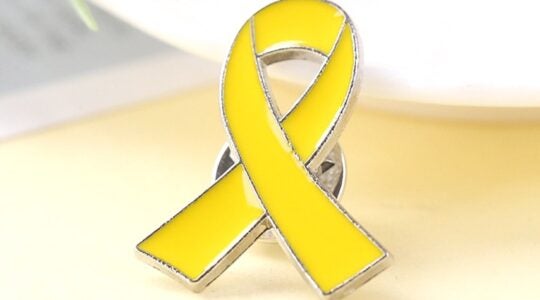NEW YORK (JTA) — For some in the Jewish community, Hurricane Irene was a soggy inconvenience.
But for others it became a moment to extend a helping hand — in at least three cases, tragically.
David Reichenberg, a 50-year-old father of four from Spring Valley, N.Y., died while saving a father and his 6-year-old son from a downed power line. He contacted the live wire and was electrocuted.
Reichenberg, an Orthodox Jew, was one of three Jews reportedly killed Sunday in the storm.
Michael Kenwood, 39, also died while attempting to help others.
A volunteer first aid worker from Princeton, N.J., Kenwood was checking a submerged car that rescuers thought was occupied when he became untethered and slipped. Kenwood was swept away by the current and later was pulled unconscious from the waters. He died the same night, reported the Trenton Times. The car was found to be abandoned.
Rozalia Gluck, 82, of Brooklyn, N.Y., was trapped in a Catskills motel that had become unmoored during the storm and floated away. Authorities recovered her body late Sunday. Isaac Abraham, a leader in the Brooklyn Chasidic community, told the New York Daily News that Gluck was a Holocaust survivor originally from Russia.
“She survived Hitler,” Abraham said, “but she couldn’t survive Irene.”
By Tuesday afternoon, 40 deaths in 10 states were attributed to Hurricane Irene, The Associated Press reported.
In the Reichenberg tragedy, he had stopped to help the father and son, who were outside viewing the damage to their home in Rockland County when the boy touched a metal fence electrified by a fallen wire. Reichenberg pulled the two from the fence but could not escape himself, witness Moishe Lichtenstein told the New York Daily News.
“When I got there the victim was on the ground and he was touching the wire, which was in the water,” Lichtenstein said. “When emergency officials got there, they couldn’t touch him. We were standing there for like five or 10 minutes. We were just praying, ‘God help this man.’ “
Reichenberg was pronounced dead at the scene and was buried Sunday night. The injured boy, Reuven Herbst, was reported to be in critical but stable condition as of Monday night. His father, whose name was not released, suffered only minor injuries.
In an interview with JTA, a longtime friend of Reichenberg, Rabbi Avrohom Braun, described him as an “upbeat person with unshakable faith.” Braun is director of admissions and education at Ohr Somayach yeshiva, which Reichenberg attended 25 years ago.
Reichenberg, who ran a sign-making shop, would attend 6 a.m. classes each day before opening his store, Braun said. He also said Reichenberg regularly volunteered to help coordinate Shabbat meals for impoverished families in Rockland County, which has a large population of Orthodox Jews.
As the cleanup effort began late Sunday and the East Coast began to return to some semblance of normality on Monday — in many areas, public transportation was still unavailable — the major denominational synagogue groups were still trying to make contact with constituent congregations in areas without power or telephone lines. They were hindered by staff members unable to get to work due to lack of train service and impassable roads.
Except for power outages and some minor flooding, no shuls reported much damage. Congregations moved Torah scrolls and historical documents to safe buildings at high ground, said Rabbi Elliott Kleinman, chief program director for the Union for Reform Judaism.
Even before the storm struck, the Jewish community attempted to prepare for the worst.
Some New York neighborhoods that are home to large Jewish communities were evacuated by order of Mayor Michael Bloomberg, including Brighton Beach and portions of Sheepshead Bay in Brooklyn and Far Rockaway in Queens.
In Baltimore, the Rosenbloom Jewish Community Center opened its doors to 395 foreign workers, mostly Eastern European college students who had been evacuated from Ocean City, Md., the Baltimore Jewish Times reported. Although the JCC, located in the Baltimore suburb of Owings Mills, Md., had been designated an emergency evacuation center three years ago, it was the first time the building had been used for that purpose.
“As a Jewish organization, the JCC has the privilege of stepping up to uphold the Jewish value of ‘hachnasat orchim’ — welcoming of guests into one’s homes,” the JCC’s leadership wrote in an e-mail, according to the report.
Before the storm, Jewish officials offered both practical and religious counsel in preparation for the hurricane. The Union for Reform Judaism issued hurricane preparation guides.
The Orthodox website Vos Iz Neias posted halachic guidelines issued years ago by the Orthodox Union, Agudath Israel of America and others for what to do on the Sabbath in the event of a hurricane. Among other things, the guidelines specified that one may leave a radio on in a room of the house that is not generally used if there is concern for safety.
“The rabbis are getting a lot of calls today,” Dov Hikind, an Orthodox New York State assemblyman from Brooklyn, told Reuters last Friday.
Lindsay Goldman, the director of UJA-Federation of New York’s J-11 Information Referral Center, reported that UJA-Federation had advised its partner agencies to activate their emergency protocols. As of Monday morning, she said, all agencies had reported that they were open.
The URJ and B’nai B’rith International both opened hurricane relief funds to collect donations for hurricane aid. As of Monday, neither organization could say how much they had collected or had decided exactly how the money would be spent or distributed.
Rhonda Love, the director of B’nai B’rith’s Center for Community Action, said that even though the disaster occurred in the densely Jewish East Coast, aid will remain consistent with past natural disaster relief efforts — based on need, not creed.
“We’ll work where there’s any opportunity to help,” Love said.
The committee that will allocate the URJ funds is reviewing damage reports from congregations but will give according to the needs of “congregations, Jewish communities or larger communities,” Kleinman said. Those decisions will be made in the next week or two, he said; as of Monday there had been no immediate requests for funds.
“Being there right away is great,” Kleinman said. “But sticking with them in the future is just as important.”
JTA has documented Jewish history in real-time for over a century. Keep our journalism strong by joining us in supporting independent, award-winning reporting.





